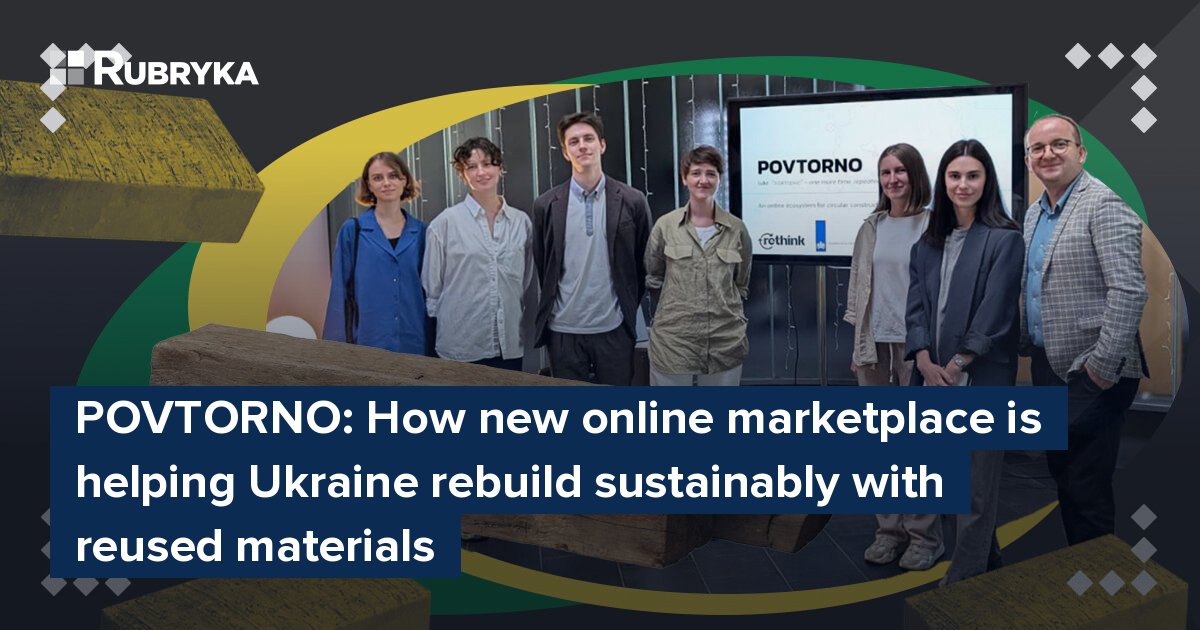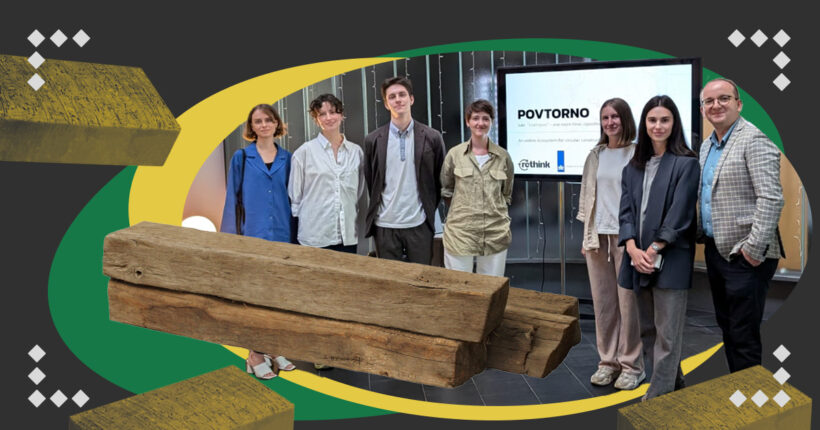
What's the problem?
Ukraine is grappling with a growing problem of construction waste, which, since 2022, has been made worse by the destruction of Russia's war. In peaceful times, construction waste builds up throughout the building process, from extracting raw materials to tearing down buildings. Much of this waste ends up in landfills, harming the environment through land, air, and water pollution. Valuable resources that can be reused, cutting costs, are wasted.
What's the solution?
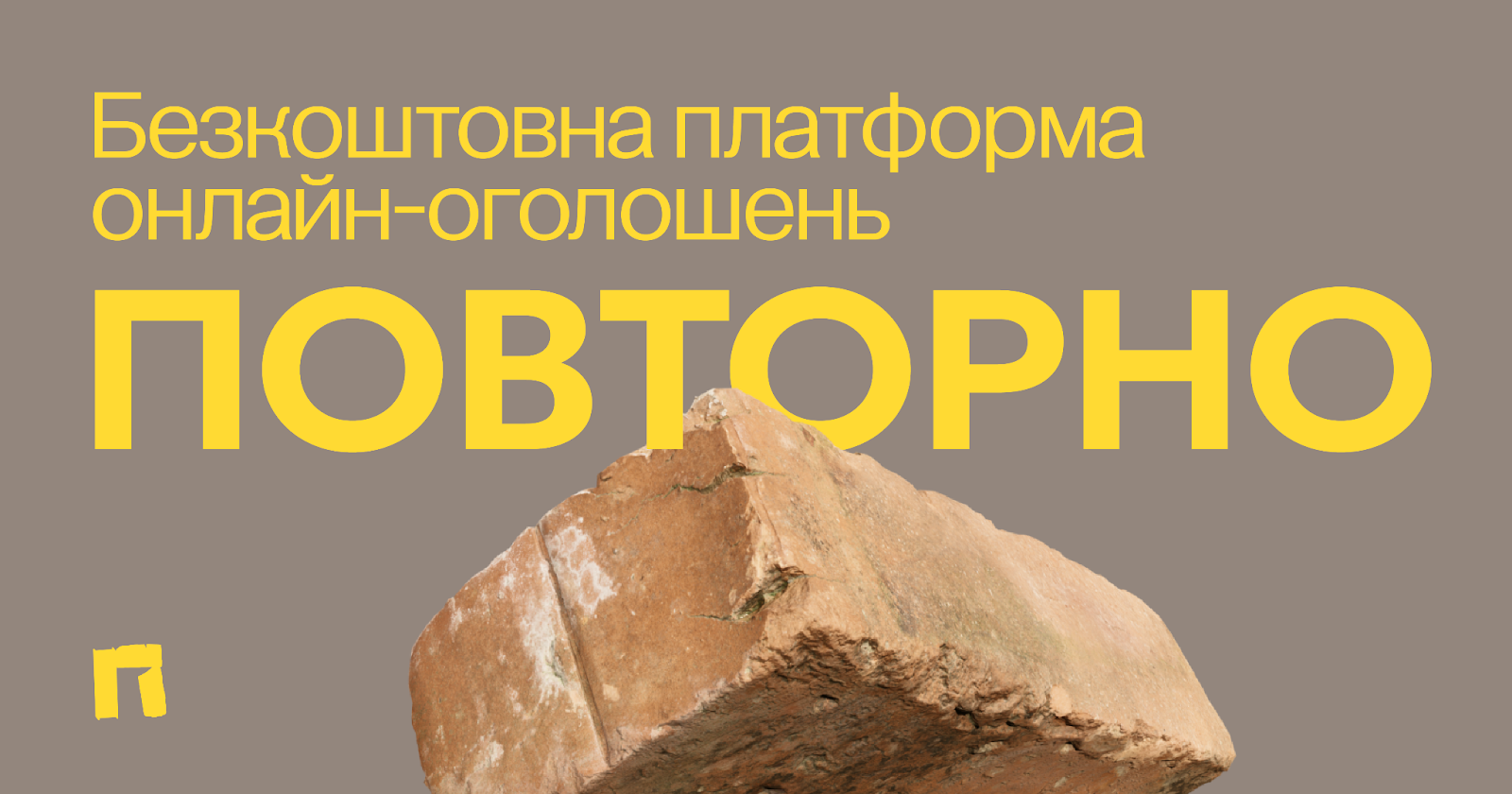
Screenshot from the POVTORNO platform. Photo: ReThink
"Considering limited resources and the priority of green reconstruction, we suggest rethinking our approach to secondary materials and seeing them as valuable resources," says ReThink, a circular economy expert organization. Since 2017, the nonprofit has brought together government bodies, businesses, communities, experts, and international partners to work toward a green recovery for Ukraine.
ReThink, with the support of the Embassy of the Netherlands in Ukraine, has launched the online platform POVTORNO — which translates from Ukrainian as "REPEATEDLY" — to streamline green construction, bring together industry players, promote circular practices, and help address the issue of construction waste disposal.
How does it work?
Giving building materials a second life
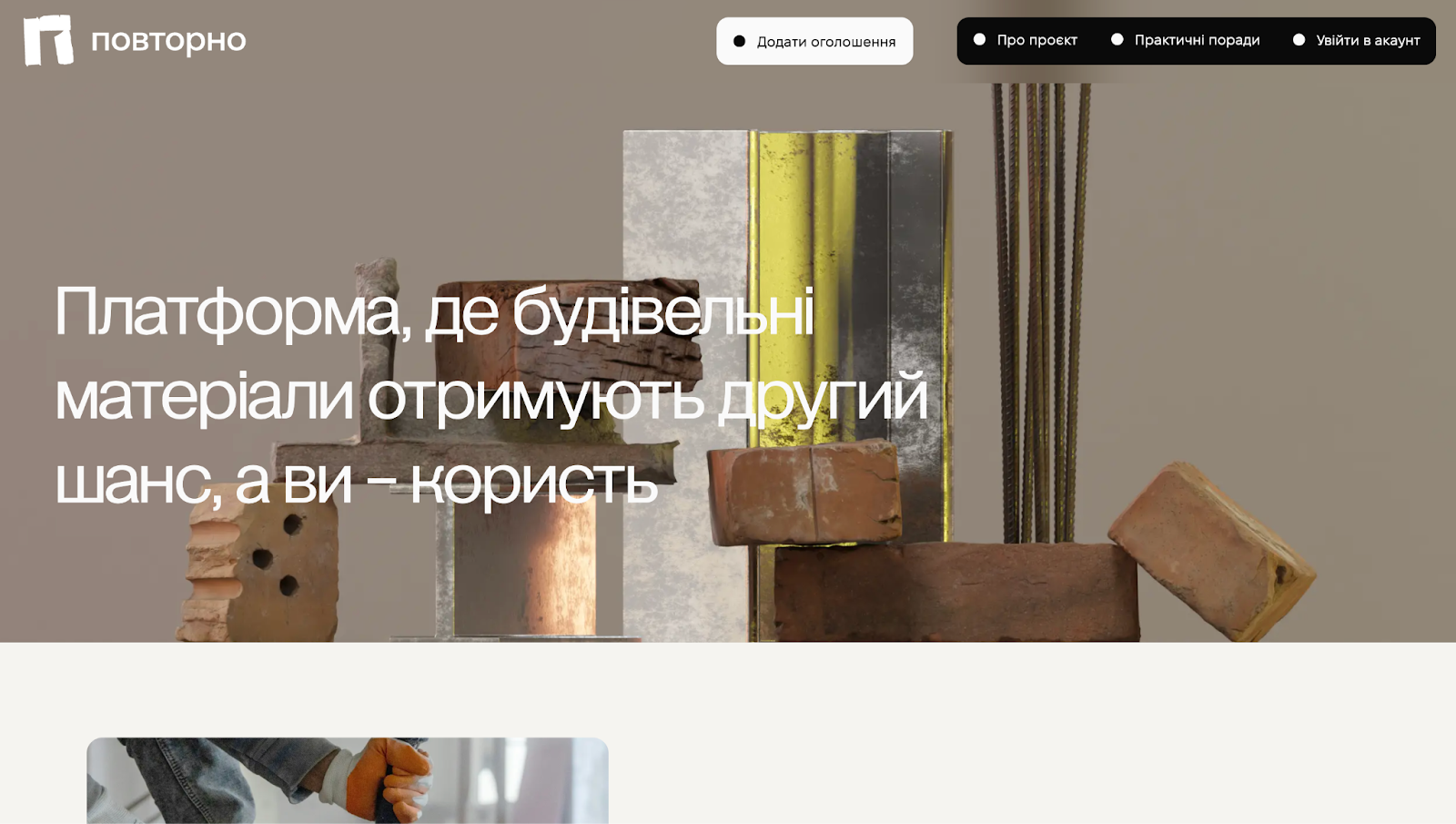
POVTORNO's Home page. Screenshot by ReThink
POVTORNO is a free online marketplace where users can find, buy, or sell old building materials, leftovers, and unused construction supplies. It also offers practical advice and educational content on using these materials. The platform serves as a resource for those who want to build sustainably, cost-effectively, and responsibly. According to the creators, it opens up new possibilities for creating a sustainable future in Ukraine by using resources already at hand.
"People in construction face many barriers when trying to reuse materials — doubts about quality, a lack of trusted suppliers, and limited knowledge about restoration techniques," says Svitlana Usychenko, POVTORNO project coordinator. "POVTORNO helps overcome these obstacles, making architectural solutions more environmentally sustainable."
According to Roman Puchko, ReThink co-founder and director, the idea for the POVTORNO platform emerged in the summer of 2022. After Russia unleashed its full-scale invasion, Ukraine faced a massive amount of construction and destruction waste.
Last year, ReThink conducted a comprehensive study titled "The State and Prospects of Circular Construction in Ukraine. " The study surveyed over 80 Ukrainian architects and designers and conducted 17 interviews with representatives of the construction sector. ReThink also visited building sites to examine modern demolition methods and explore the economic and legal challenges limiting the broader use of recycled materials in construction.
This research provided valuable insights into the industry's problems. The findings showed that Ukraine needs more practical solutions for handling leftover construction materials and secondary raw materials.
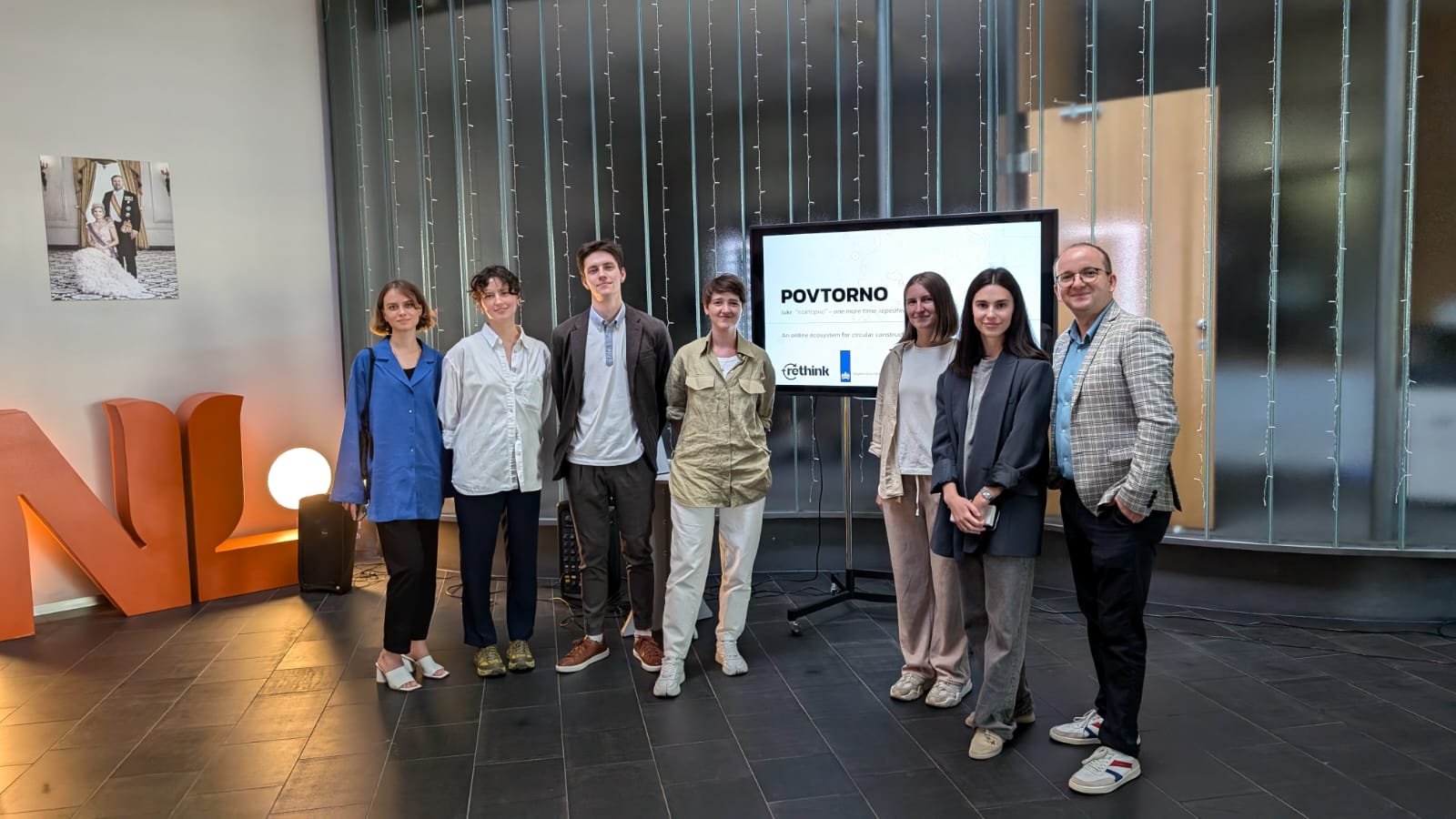
Presentation of POVTORNO at the Embassy of the Kingdom of the Netherlands in Ukraine to donors by the ReThink team. Photo: ReThink
"In countries like the Netherlands, Belgium, and France, similar platforms already exist," says Roman Puchko. "Our collaboration with the Dutch company geoFluxus, which uses data analysis to identify materials that can be saved from becoming waste, greatly inspired us to create POVTORNO. They showed us just how many opportunities there are for reusing materials."
The project's primary goal is to prove that reusing building materials can be eco-friendly and an economically viable solution that benefits businesses, communities, and the environment.
"This project embodies the core values of ReThink — systemic thinking, community engagement, and sustainability. It adds a deeper meaning to our work because we unite different people around a common goal, finding solutions that not only advance the circular economy but also meet the needs of all users," says Puchko.
What does POVTORNO offer?
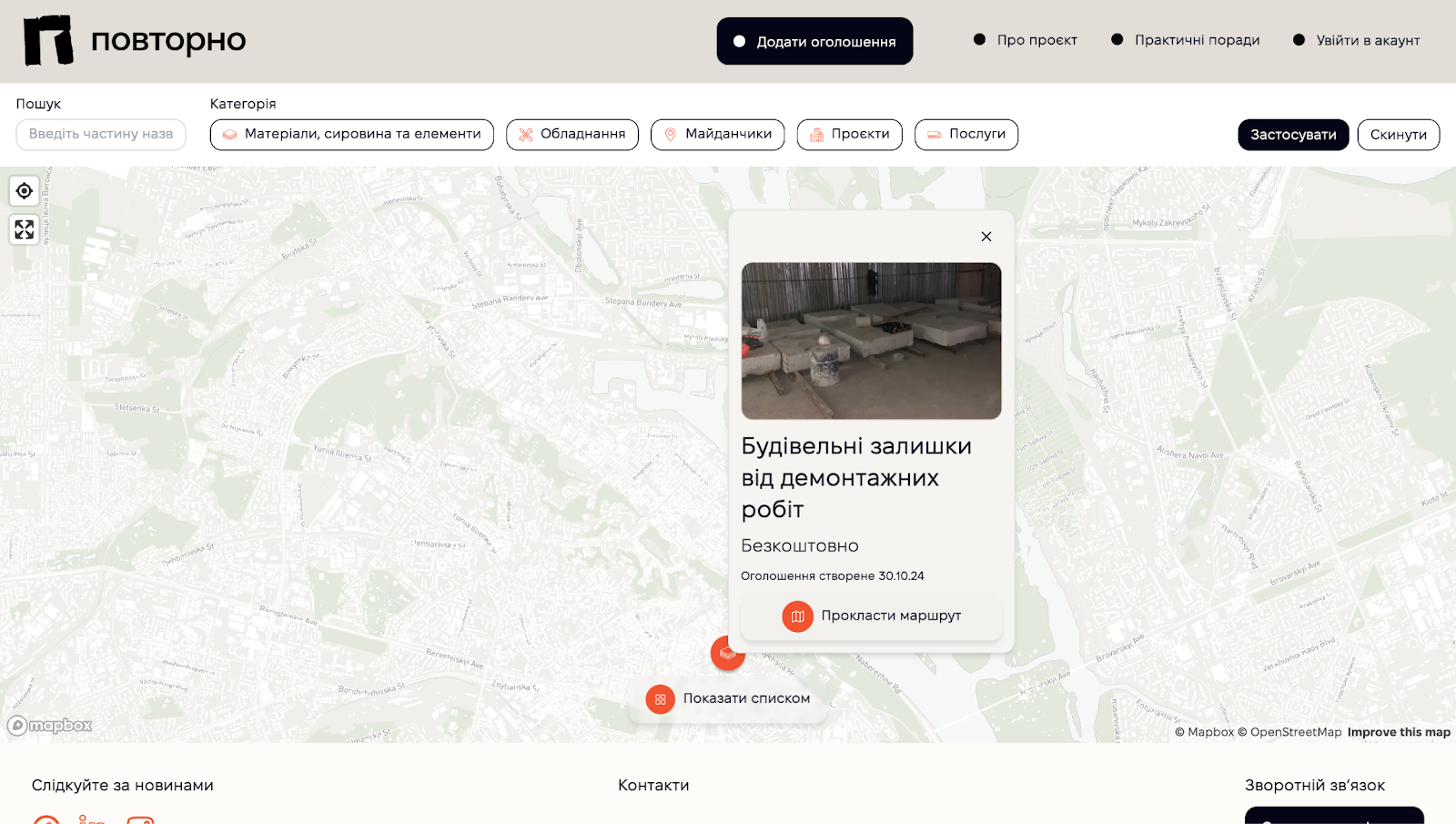
Map with an ad from a verified provider on POVTORNO. Screenshot by ReThink
POVTORNO is open to everyone. If you have leftover building materials or secondary resources to share, you can register and post both paid and free listings. The platform also registers verified suppliers, which ReThink experts verify and approve. This helps connect architects, businesses, communities, and international partners looking for sustainable construction solutions.
Beyond the listings, POVTORNO also provides practical guides and educational materials. For example, in the "Practical Tips" section, you can find guides on how to work with reused materials, along with case studies. The platform also informs users about potential risks, such as the need for safety measures when handling potentially contaminated materials.
According to the platform creators, POVTORNO will benefit:
- Demolition, construction, and renovation companies and private contractors: They can easily sell leftover materials, saving on disposal costs and creating new business opportunities.
- Architects: The platform offers eco-friendly and unconventional materials for the creators of unique projects.
- Cities and communities looking for contractors to handle demolition waste in a circular way: The platform has a dedicated page called "Sites," where municipalities can list leftover demolition materials for free.
- Local projects: The "Projects" page allows users to request local materials, either free or paid.
POVTORNO also highlights the cultural and historical value of materials. In many countries, old materials left after destruction are reused in significant architectural projects. ReThink wants to inspire Ukrainian professionals and the public to see the potential of reusing materials that carry historical memory.
Which materials are in high demand in Ukraine?
According to ReThink experts, there's growing interest in eco-friendly and energy-efficient materials like wooden beams and red bricks. There's also a demand for repurposing reinforced concrete from typical housing found throughout Ukraine.
"These materials can often be reused, either as structural components or for facades and interiors, after additional processing. Reusing metal beams and columns is already common in industrial buildings, but there's potential for broader use. Reusing furniture, doors, and windows is also in demand, and some Ukrainian companies are already successfully doing this," says ReThink leader Roman Puchko.
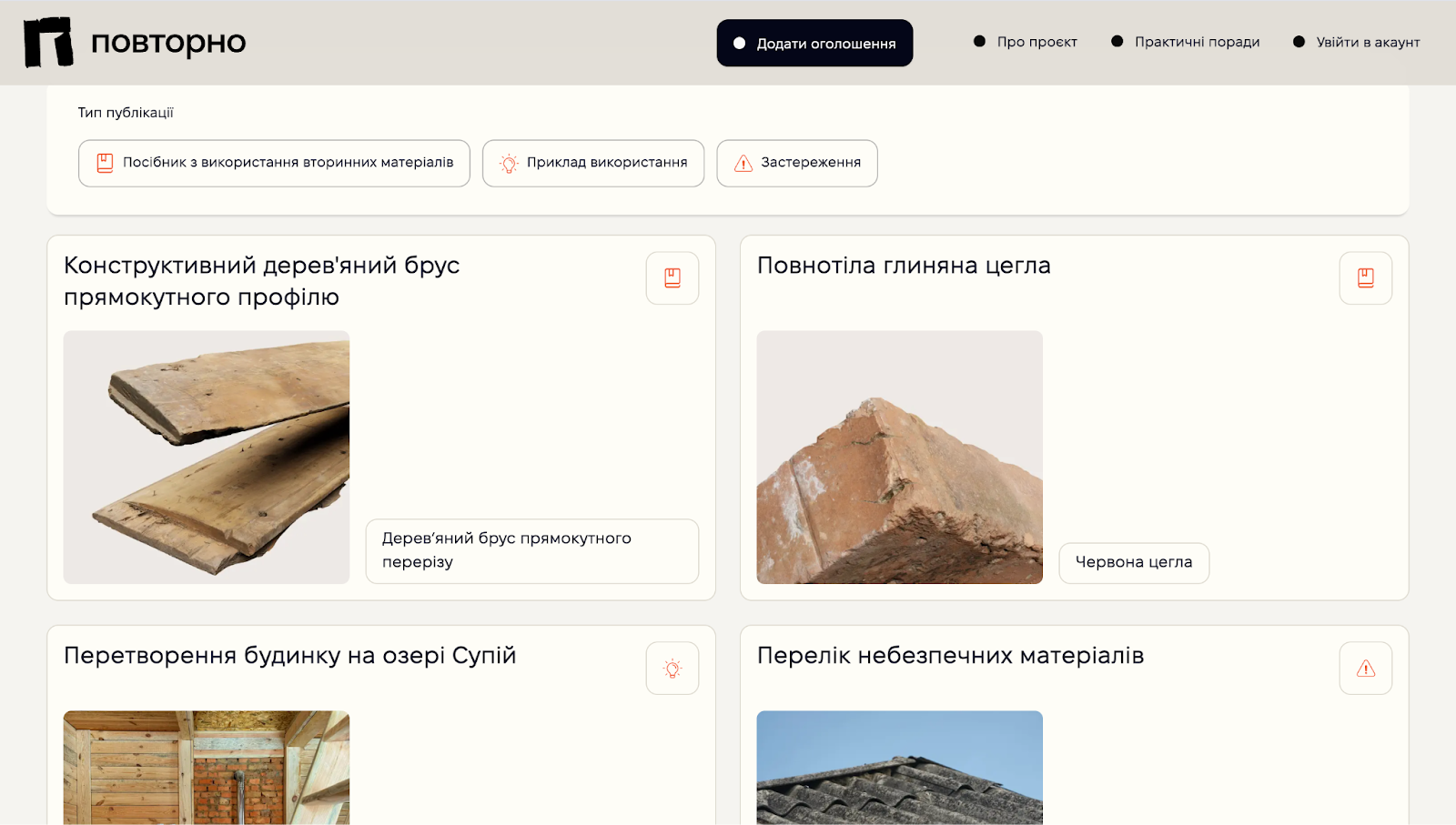
A section with practical tips for reusing materials. Screenshot by ReThink
In the "Practical Tips" section, users can find examples of how materials have been reused, including projects with repurposed wooden beams and bricks and a case study from a lake house renovation at Supii Lake. Rubryka reported more on the case here.
However, project manager Natalia Fadieieva notes that not all materials from war-damaged buildings can be reused. The extent of damage and asbestos-containing elements can complicate the process.
"Damaged roofing or asbestos elements often contaminate the rest of the structure, making safe dismantling and material recovery difficult. As a result, everything may need to be discarded together, wasting resources. That's why we inform our users about these risks, as many are unaware of the dangers of asbestos," says Fadieieva.
Does it really work?
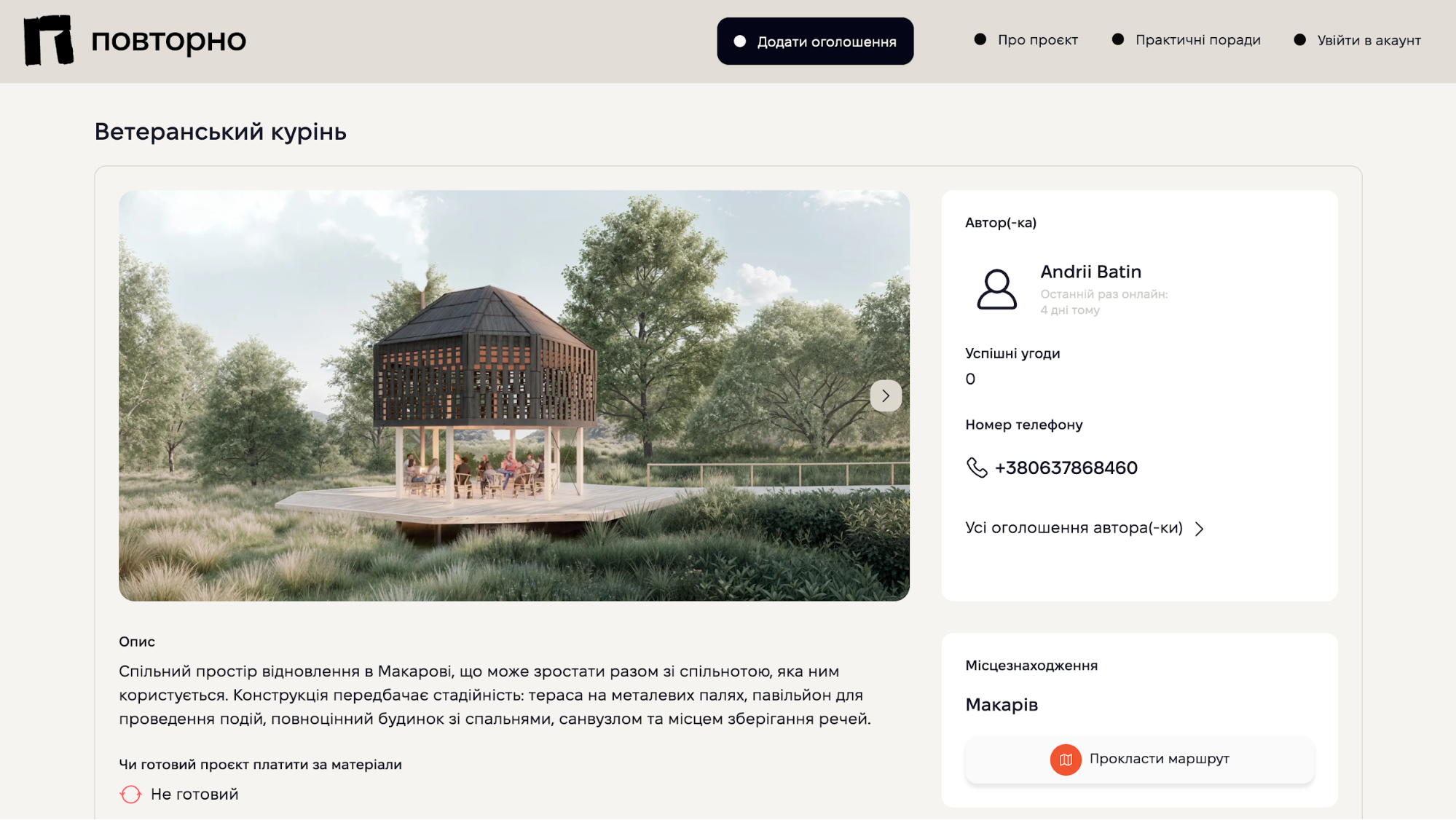
A post with a description of the construction project. Screenshot by ReThink
POVTORNO launched last week, and, according to ReThink, many projects and companies are already posting requests and listings. For example, the "Our Place" initiative, creating a space for the military and their families in Makariv, has requested building materials. Large demolition companies like NRAV-Diamant and the Tereshchenko Group have also listed their services and materials on the platform.
"Our main goal is to simplify the process of reusing building materials in Ukraine," says the project's team. "We measure our success by real-life cases of successful reuse made possible by the platform. Each project that finds materials or services through POVTORNO demonstrates the economic and environmental benefits of reuse."
Currently, ReThink is focused on attracting users, developing the platform, and building partnerships. The team stresses that it is open to feedback from the market: "We want to develop this project collaboratively with the community to ensure it meets real needs."
POVTORNO is an informational platform. All transactions are made directly between users. ReThink is not responsible for the quality of the materials or users' actions.


